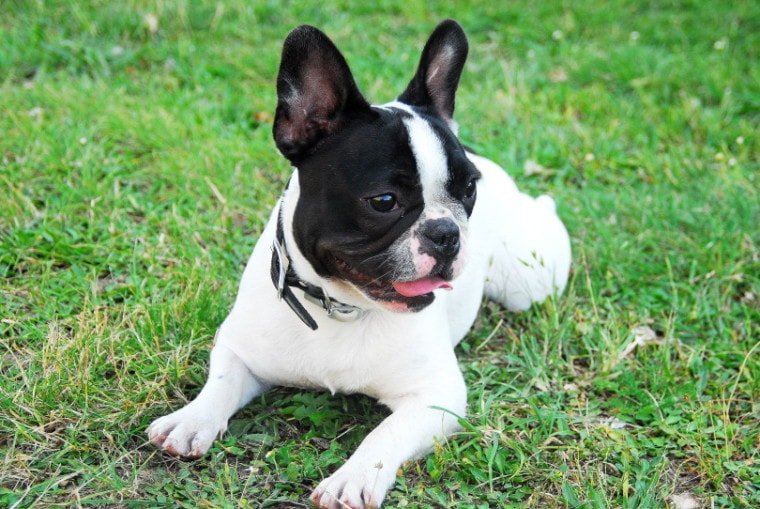
Click Below to Skip Ahead
Boston Terriers earned the nickname “The American Gentleman” thanks to their tuxedo coat, attentive nature, and general friendliness and good manners.
Breed Overview
Height
15 – 17 inches
Weight
12 – 25 pounds
Lifespan
11 – 13 years
Colors
Tuxedo, brindle with white markings, seal with white markings
Suitable for
Urban living, homes with daily activity, homes with children
Temperament
Friendly, alert, people-oriented, curious, comedic
These compact dogs are always up for adventure and are a never-ending source of laughs for everyone around them. They make great urban companions, but they’re always up for a little adventure, whether that’s a trip to the local coffee shop or a short hike. These dapper dogs are bright and attentive, which makes them trainable, but they can also be a little mischievous. Keep reading for more information on these fabulous little dogs.
Boston Terrier Characteristics
Boston Terrier Puppies
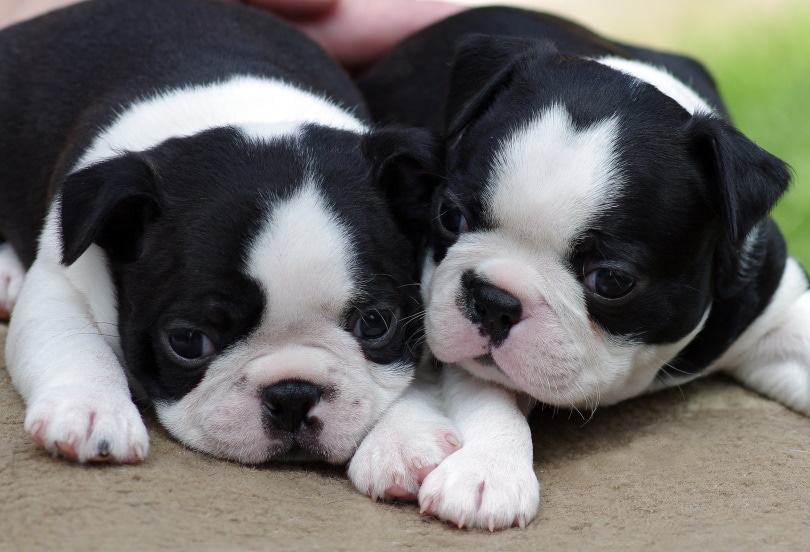
The Boston Terrier is a popular dog around the world. They are known for their adorable and unique faces, but they also are prone to more health conditions than other dog breeds. Make sure you’re getting your Boston Terrier from a breeder who has tested the parents for heart and eye problems and who only breeds healthy dogs with healthy hearts and eyes. Even the best breeders can’t always breed out health conditions, though, so be prepared for the possibility of high medical expenses with a Boston Terrier.
When you welcome a Boston Terrier into your home, be prepared to have a friendly, funny, and loving dog around. They’re very smart, making them easy to train.
Temperament & Intelligence of the Boston Terrier
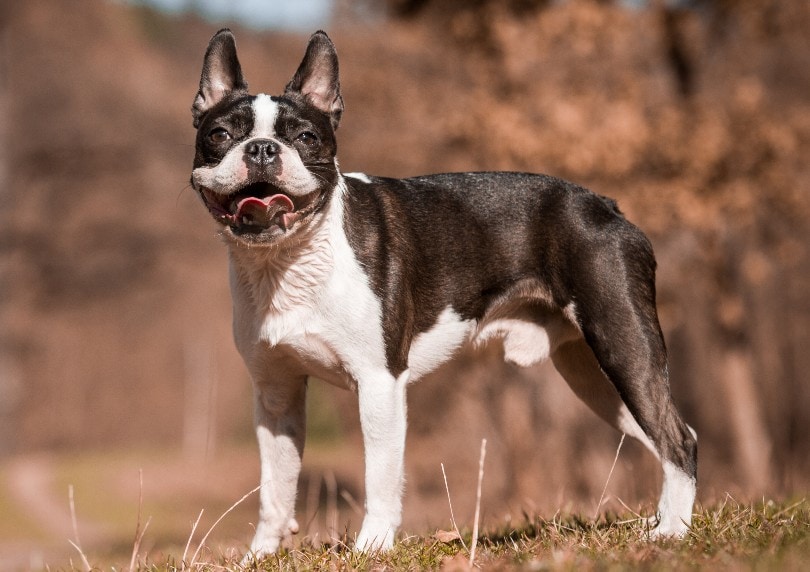
Are These Dogs Good for Families? 👪
Boston Terriers make excellent family dogs because of their gentle, fun personalities and high trainability. They are usually friendly and sociable with all people, but they form special bonds with their people. They may choose a favorite person in the family, but they are usually loyal to the whole family and always looking for a game to play or a lap to sit in.
Does This Breed Get Along with Other Pets?
These dogs are usually great with other animals, but you’re more likely for them to all get along if they’re raised together from a young age, especially when you’re dealing with cats. When this isn’t possible, slow, safe introductions are necessary to help build trust between the animals. Be aware that since they are terriers, it wouldn’t be totally out of place for your dog to have a prey drive toward small animals like rodents and reptiles. Never leave your Boston Terrier with small animals without direct supervision by an adult.
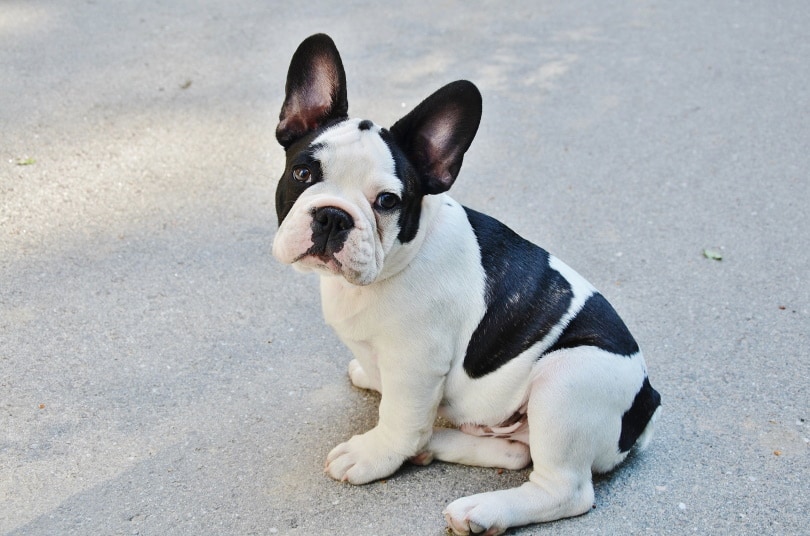
Things to Know When Owning a Boston Terrier:
Food & Diet Requirements 🦴
Boston Terriers are prone to obesity, so it’s extremely important to provide your dog with a healthy diet in proper portions with limited treats. Low calorie training treats are a great option for treating your Boston Terrier, especially in training sessions when they’re getting lots of treats. Many people are used to seeing overweight dogs, so it’s often hard to determine what a healthy-weight dog actually looks like. Talk to your vet for recommendations on your Boston Terrier’s weight and body composition.
Exercise 🐕
Keeping your Boston Terrier active is one of the most important ways to prevent obesity and to keep their joints and muscles strong. These dogs love games and activities, so how you exercise your Boston Terrier is completely up to what the two of you enjoy. Since Boston Terriers are brachycephalic, or flat-faced, they are predisposed to breathing difficulties. Brachycephalic dogs are especially sensitive to heat, so limit your Boston Terrier’s exercise to indoor activities or brief workouts when the weather is above 70-80°F. Your Boston Terrier will likely enjoy participating in sports like agility, flyball, and even dock diving.
If your Boston Terrier is overweight or obese, talk to your vet about an exercise routine for them. Overweight dogs, especially overweight brachycephalic dogs, can’t go from zero exercise to lots of exercise overnight. You can do more harm than good by overworking your overweight dog.
Training 🎾
Boston Terriers are known for their friendliness and sociability, which makes them excellent companion dogs. They are highly trainable and they’re intelligent but stubborn, so you may have to get creative when training your dog. They grow very attached to their family, so it’s important to provide plenty of positive reinforcement when training them to avoid problems with trust-building.

Grooming ✂️
Since Boston Terriers have short coats, they have limited grooming needs. You should brush your dog weekly to help remove loose hair and dirt. This will also stimulate oil production in the skin, which helps keep the coat healthy and shiny. Your Boston Terrier should be bathed every 2-4 weeks or so, unless they require more frequent baths for health or hygiene reasons.
Health and Conditions 🏥
- Related Read: How Long Do Boston Terriers Live?
Male vs Female
Male Boston Terriers are known to be friendlier, more sociable, and more dedicated than females are. Female Boston Terriers often have aloof personalities and may not form the same close bonds with the family that males form. Females also tend to be more high strung than males, which can require a quiet environment or a higher activity level to help balance. Female Boston Terriers do usually have the bright, sweet nature, which is part of the breed standard, but they tend to be more subdued than males.
3 Little-Known Facts About the Boston Terrier
1. They were bred for fighting.
Boston Terriers were originally bred to be compact pit fighting dogs! Their muscular build and, at the time, poor temperament toward other animals made them ideal fighting dogs. However, the breed has evolved through selective breeding since then and is now known for its sociability and friendliness, even with children and other animals.
2. They all descend from one dog.
All Boston Terriers descend from one dog by the name of Judge. Judge was a mixed breed who was purchased by Robert C. Hooper around 1875. It’s believed that he was a mix of English Bull Terrier and English Bulldog, but some people believe that Judge also had some type of toy or small terrier lineage. As time went on, Judge’s descendants began being bred as dogs that could function as companion dogs to gentlemen, and the Boston Terrier was created.
3. They’ve never won Westminster.
That’s right! The little tuxedo-wearing gentleman has never won Westminster, the oldest kennel club dog show in the United States. However, Boston Terriers have proven themselves winners time and time again in competitions like obedience, agility, flyball, and other competitive sports.
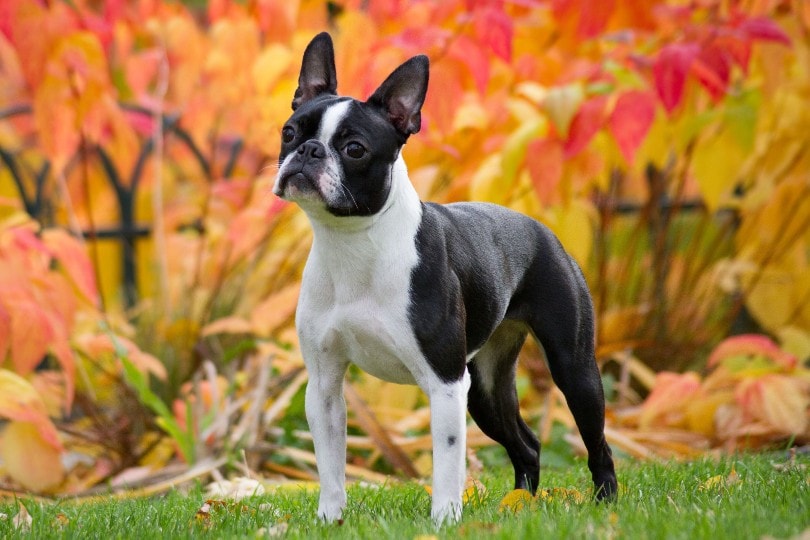
Final Thoughts
If you’re looking for a small dog for an active, urban environment, the Boston Terrier may be your perfect match. These dogs make excellent partners and are usually up for whatever, but they do require some additional care due to their flat faces. Boston Terriers have more health condition predispositions than most other small dogs, so that should be a consideration when you’re looking for a dog.
Even still, Boston Terriers are great companions that make good pets for families with children and other pets. They’re usually a laid-back breed that happily coexists and actively plays with children and pets. For a curious, happy-go-lucky dog that will form a strong bond with you, the Boston Terrier is a wonderful pick.
Related Reads:
- 7 Best Dog Foods for Boston Terriers – Reviews & Top Picks!
- Is a Boston Terrier Hypoallergenic? Vet-Reviewed Facts & FAQ
Featured Image Credit: Piqsels







